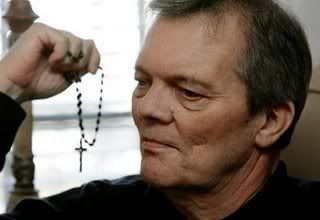Misc  General
General  General Archive
General Archive  Losing Casey
Losing Casey
 General
General  General Archive
General Archive  Losing Casey
Losing Casey
Written by
Erik Cassano
 The Cleveland sports world lost an icon early Monday morning when Casey Coleman succumbed to pancreatic cancer at the young age of 55. In his latest, Papa Cass takes a look back at the life and legacy of Casey and comments on his personal memories of the broadcasting legend. We're rounding third, and heading home. R.I.P. Casey ...
The Cleveland sports world lost an icon early Monday morning when Casey Coleman succumbed to pancreatic cancer at the young age of 55. In his latest, Papa Cass takes a look back at the life and legacy of Casey and comments on his personal memories of the broadcasting legend. We're rounding third, and heading home. R.I.P. Casey ...
 Visit the Papa Cass weblog at http://papacass.blogspot.com/
Visit the Papa Cass weblog at http://papacass.blogspot.com/
Everyone says Casey Coleman was one of those people who, if you didn't know them personally, you were missing out.
I never knew Casey personally. I just watched him every night growing up, showing us the world of sports at the tail end of the WJW Channel 8 newscast.
I missed out. I never knew Casey, the warrior in the battle against pancreatic cancer, which claimed his life Monday at age 55.
I never knew the Casey who was winning his battle with alcoholism. I never knew the Casey that so many in the sports world knew, the Casey that existed when the microphone was off and the camera light went dark.
But in some ways, I didn't miss out. None of us did. In some basic way, all you needed to have an appreciation of Casey Coleman was a love of Cleveland sports and a fascination with the people who ran, coached and played for the teams.
For my generation, Casey was the nightly emcee presenting Cleveland sports to the fans. He was our tour guide, piloting us through the Browns' playoff run of the late '80s, through the Indians' resurgence in the '90s, and then moved on to radio at WTAM, where he helped usher in the LeBron James Era.
In between, he briefly served as the Browns radio voice and forged a long-standing friendship with Bill Belichick, which made him somewhat of a controversial figure when the team left in 1995.
In the aftermath of the move, when fingers were pointing and heads were rolling like it was the French Revolution, Casey could have gone down in history as a villain, a Benedict Arnold consorting with the enemy. But he emerged a better man for having endured the ordeal, and his on-air charm won his fans back. If they ever really left at all, that is.
Casey was loved because he gave love. Love to the teams in this town, love for his job, love for his city. He was a model Cleveland sports fan in many ways. He showed how you can be a fan of Cleveland sports without developing a choking inferiority complex, how to be critical without bashing, how to praise without being a homer.
In an era devoid of championships, an era where badmouthing Cleveland sports teams is a regular occurrence, Casey didn't sink to that level. He embraced Cleveland's teams even when it wasn't popular. Even when the teams betrayed us. Even when one of them left.
And in his dying days, he taught this sports-crazed town his greatest lesson: it's just sports.
When his illness wouldn't let him work fulltime anymore, he took up the fight against pancreatic cancer, leading fundraisers and speaking at events in an attempt to raise awareness about the disease.
He asked Plain Dealer reporter Chuck Heaton to follow him around and chronicle his fight. Heaton wrote a seven-part series on Casey's battle with cancer.
And Casey did it all with his trademark self-deprecating wit, which never abandoned him to the end.
I saw Casey in person once since his cancer diagnosis. It was at the Browns-Bears preseason game in August. He was on the sideline, press pass around his neck, standing on the field once occupied by old Cleveland Stadium, his self-dubbed "House of Thrills," soaking it all in for one of the last times in his life.
If he was anything but content at that point, he never let on.
At the end of every sportscast, he'd add a little clip about something lighthearted that happened in the world of sports that day, like a baseball blooper. He'd finish with what became his catchphrase, "And we're rounding third, and heading home."
For the rest of my life, that phrase will be painful and poignant in equal amounts. Casey Coleman has gone home. There's no going back.
 Visit the Papa Cass weblog at http://papacass.blogspot.com/
Visit the Papa Cass weblog at http://papacass.blogspot.com/Everyone says Casey Coleman was one of those people who, if you didn't know them personally, you were missing out.
I never knew Casey personally. I just watched him every night growing up, showing us the world of sports at the tail end of the WJW Channel 8 newscast.
I missed out. I never knew Casey, the warrior in the battle against pancreatic cancer, which claimed his life Monday at age 55.
I never knew the Casey who was winning his battle with alcoholism. I never knew the Casey that so many in the sports world knew, the Casey that existed when the microphone was off and the camera light went dark.
But in some ways, I didn't miss out. None of us did. In some basic way, all you needed to have an appreciation of Casey Coleman was a love of Cleveland sports and a fascination with the people who ran, coached and played for the teams.
For my generation, Casey was the nightly emcee presenting Cleveland sports to the fans. He was our tour guide, piloting us through the Browns' playoff run of the late '80s, through the Indians' resurgence in the '90s, and then moved on to radio at WTAM, where he helped usher in the LeBron James Era.
In between, he briefly served as the Browns radio voice and forged a long-standing friendship with Bill Belichick, which made him somewhat of a controversial figure when the team left in 1995.
In the aftermath of the move, when fingers were pointing and heads were rolling like it was the French Revolution, Casey could have gone down in history as a villain, a Benedict Arnold consorting with the enemy. But he emerged a better man for having endured the ordeal, and his on-air charm won his fans back. If they ever really left at all, that is.
Casey was loved because he gave love. Love to the teams in this town, love for his job, love for his city. He was a model Cleveland sports fan in many ways. He showed how you can be a fan of Cleveland sports without developing a choking inferiority complex, how to be critical without bashing, how to praise without being a homer.
In an era devoid of championships, an era where badmouthing Cleveland sports teams is a regular occurrence, Casey didn't sink to that level. He embraced Cleveland's teams even when it wasn't popular. Even when the teams betrayed us. Even when one of them left.
And in his dying days, he taught this sports-crazed town his greatest lesson: it's just sports.
When his illness wouldn't let him work fulltime anymore, he took up the fight against pancreatic cancer, leading fundraisers and speaking at events in an attempt to raise awareness about the disease.
He asked Plain Dealer reporter Chuck Heaton to follow him around and chronicle his fight. Heaton wrote a seven-part series on Casey's battle with cancer.
And Casey did it all with his trademark self-deprecating wit, which never abandoned him to the end.
I saw Casey in person once since his cancer diagnosis. It was at the Browns-Bears preseason game in August. He was on the sideline, press pass around his neck, standing on the field once occupied by old Cleveland Stadium, his self-dubbed "House of Thrills," soaking it all in for one of the last times in his life.
If he was anything but content at that point, he never let on.
At the end of every sportscast, he'd add a little clip about something lighthearted that happened in the world of sports that day, like a baseball blooper. He'd finish with what became his catchphrase, "And we're rounding third, and heading home."
For the rest of my life, that phrase will be painful and poignant in equal amounts. Casey Coleman has gone home. There's no going back.
Posted by
Erik Cassano
Nov 27, 2006 7:00 PM
- NBA Announces 2013-2014 Schedule
- Browns Ink Sharknado
- Sharknado A No-Show For Rookie Camp
- Trent Richardson Out Until Training Camp
- Browns Sign Brandon Jackson
- Carrasco Suspended Eight Games
- Browns Add to Wide Receiver Depth with David Nelson
- Browns Need to Learn from Past Draft Mistakes
- Browns Release Chris Gocong and Usama Young
- Browns Missing on Grimes Disappointing, But Not The End
The TCF Forums
- Movies coming out
rebelwithoutaclue (Tuesday, January 21 2014 12:56 PM) - 2015 Recruiting
jclvd_23 (Tuesday, January 21 2014 12:38 PM) - The 2014 Offseason Thread
Larvell Blanks (Tuesday, January 21 2014 12:25 PM) - Official- Browns Coach Search/Rumors
Larvell Blanks (Tuesday, January 21 2014 11:53 AM) - Chris Grant's first 3 drafts
Kingpin74 (Tuesday, January 21 2014 10:13 AM) - Mike Brown
YahooFanChicago (Monday, January 20 2014 11:15 PM) - 2014 Hoops Hockey Hijinx
jpd1224 (Monday, January 20 2014 4:44 PM) - 2014 Recruiting
jclvd_23 (Monday, January 20 2014 2:26 PM) - Wish List - #4 Pick
Hikohadon (Monday, January 20 2014 1:26 PM) - #1 overall pick Anthony Bennett
TouchEmAllTime (Sunday, January 19 2014 1:28 PM)



